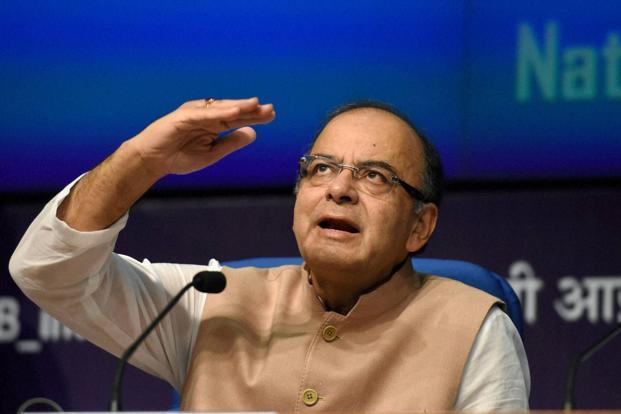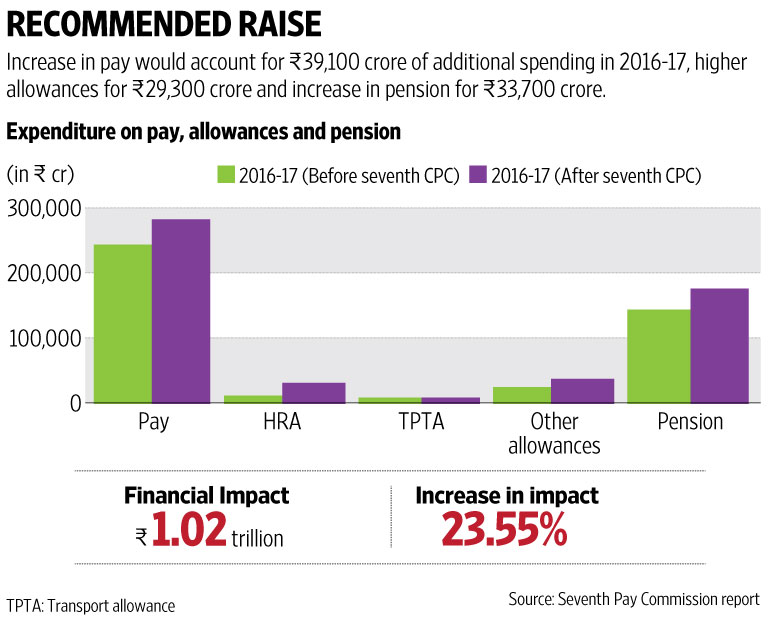
New Delhi: The Union cabinet on Wednesday approved pay and pension raises that will put an additional Rs. 1.02 trillion in the hands of 10 million central government employees and pensioners in the current fiscal, delivering a potential boost to the consumer economy.
At a meeting chaired by Prime Minister Narendra Modi, the cabinet accepted the recommendations of the Seventh Pay Commission for pay and pension increases ranging from 14% to 23.5% for 4.7 million employees and 5.3 million pensioners.
Entry-level basic pay will more than double to Rs.18,000 per month from Rs.7,000 and at the level of cabinet secretary, the top-most civil servant, will rise to Rs.2.5 lakh from Rs.90,000.
The government said the raises, which will be backdated to January 2016, will have a multiplier effect on the economy. Demand for housing, automobiles and consumer durables is expected to increase, providing a fillip to the economy.
Finance minister Arun Jaitley termed the increases a “historic rise” in emoluments. The arrears will be paid in the current year as well so that employees can plan their “investments and savings” well, he said.
Besides the additional Rs.1.02 trillion that will be spent in the current year, the government will need to pay Rs.12,133 crore on account of arrears dating back to the last financial year.

The Indian economy grew 7.6% in fiscal year 2015-16 and 7.9% in the March quarter, thanks to a sustained recovery in private consumption demand, although investment demand is yet to recover.
The One Rank One Pension scheme for ex-servicemen, which is already being implemented, coupled with the pay and pension increases, will likely add more ballast to urban spending, a key driver of the Indian economy.
Jaitley cautioned that while stimulating demand and boosting savings, the move may also push up inflation which, based on the consumer price index (CPI), accelerated at the fastest pace in 21 months in May. The CPI rose 5.76% in May, from a revised 5.47% in April.
“Inflationary pressure is a third consequence” of the pay and pension increases, Jaitley told reporters in New Delhi.
The implementation of Seventh Pay Commission recommendations will have a “snowball impact” on the economy, said Motilal Oswal, chairman and managing director of Motilal Oswal Financial Services Ltd.
Oswal expects economic growth to accelerate. “The auto, consumer durables and FMCG (fast-moving consumer goods) sectors would see much higher demand. A small concern could be that this may push inflation a bit higher,” he said.
The industry welcomed the move.
Jamshyd Godrej, chairman of Godrej & Boyce Manufacturing Co. Ltd, said demand for consumer appliances will accelerate.
“We expect growth rate to increase to 15% in 2017 from around 10% at present. In the past, the consumer appliances division has seen growth rates of 20% and we see no reason why it can’t get back to that,” he said.
A spokesperson for automaker Maruti Suzuki India Ltd said central government employees contributed around 17% of the company’s sales by volume, or around 200,000 units, last year, which he expects will increase to 250,000 this year.
Rating agency India Ratings and Research Pvt. Ltd estimated that the move will boost consumption by Rs.45,110 crore and increase savings by Rs.30,710 crore.
Justifying the hike, Jaitley said salaries of government employees had to rise to respectable levels to attract talent. Beginning with the recommendations of the Fifth Pay Commission, the effort has been to raise government salaries to private sector levels, he said.
At least at the lower end of the wage pyramid now, government salaries are “distinctly higher than (those in) the private sector”, he added.
The government said the new pay band will be 2.57 times higher than the one recommended by the Sixth Pay Commission.
According to the Seventh Pay Commission’s report, increase in pay would account for Rs.39,100 crore of additional spending in 2016-17, higher allowances for Rs.29,300 crore and increase in pension for Rs.33,700 crore.
Finance secretary Ashok Lavasa said the government was setting up two separate committees to review the allowances paid to employees and the national pension system. Both panels will submit their reports in four months.
The pay commission had recommended a life insurance cover of up to Rs.50 lakh for government employees, up from just Rs.1.2 lakh now, with staff contributing up to Rs.5,000 a month. This suggestion has not been accepted as it will drain the take-home salary of staff. “Instead, we will explore ways for giving better group insurance to the employees,” Lavasa said.
Central government employees will benefit immediately from the acceptance of the pay commission recommendations, but their counterparts at public sector units and autonomous government institutions will need to wait.
Separate committees will decide pay increases for those employees, keeping in mind the pay commission recommendations.
A section of government employees wasn’t happy with the raise and threatened a strike from 11 July . The National Joint Council of Action, a confederation of central government employee organizations, said it wanted higher minimum pay and demanded the prime minister’s intervention.
Jaitley said two committees that will be set up will look into any anomalies in the pay commission recommendations and demands by staff. But such demands, if accepted, would divert funds from development work, “which is not correct”, he said.